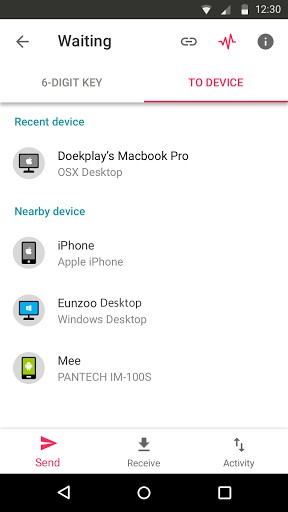

We currently have over 540,000 monthly unique devices with this number increasing by 17% a month.” “ over 1.5 million downloads spanning more than 120 countries. “We have nearly sixteen thousand reviews on the Google Play store with a 4.43 star average,” Kang says. The response to the application to date appears rather staggering, both in terms of assessment and scope. Similarly, by signing up for the recently-launched ‘My Devices’ feature, you can remotely manage any registered device. If you must upload a file, Send Anywhere lets you store it for up to 24 hours.
#File transfer send anywhere windows#
“We have apps for iOS, Android, Windows Phone and PC, Mac, a web browser,” Kang notes, “and are in the final stages of development for a Linux version.”Ī few opt-in exceptions do exist to these rules, says Kang, to meet user’s specific needs. Send Anywhere is also platform agnostic, allowing users to easily transfer across multiple devices. Whatever you send is under a secure veil of darkness.” “We cannot tell who you are, what you are sending, or even the size of the file. “We require no logon or signup,” says Estmob CSO Suhyuk Kang.
#File transfer send anywhere code#
The service is completely anonymous, allowing transfer using a six-digit or QR code that expires after ten minutes. No email, Facebook credentials, or even name. What’s more, no personal information is collected to identify the user. By sharing resources directly without the use of an administrative system go-between, there’s nothing left stored on either a central server or remote cloud to be compromised. Send Anywhere takes file storage out of the equation, letting users send data peer-to-peer or through direct relay. Its mobile and web application Send Anywhere offers a unique blend of features that could put file sharing worries to rest. Almost half believe their company lacks clear visibility of staff-use file-sharing or file sync-and-share applications and the research also showed employees are routinely violating IT policy to get things done faster, creating security risks. If paid experts are still vexed by these problems, how much worse must it be for the average user?īut South Korea-based company Estmob may have an answer. Regrettably enough, that’s not even the sole concern or frustration with file transfers today. In a recent study by the Ponemon Institute, 68% of IT professionals reported it is difficult or very difficult to share documents or files with outside business partners.


 0 kommentar(er)
0 kommentar(er)
